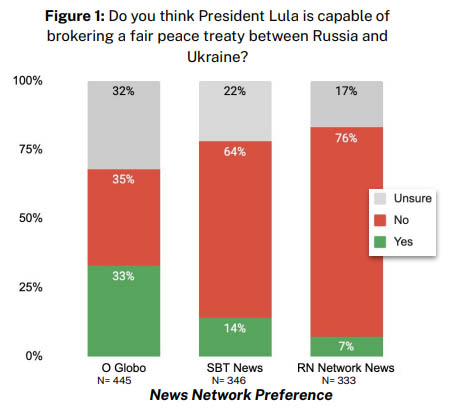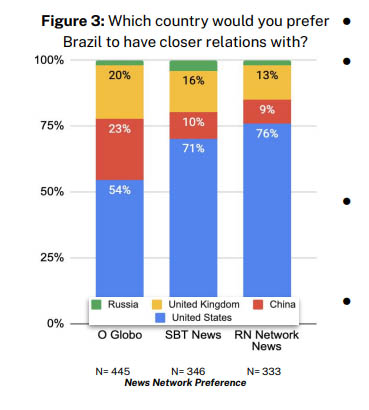Despite Russian State Visit, Brazilians Doubt Lula’s Role as Peace Broker in Ukraine
Tracking Global Events | 26 April 2023
On April 17th, Russian Foreign Minister Sergey Lavrov touched down in Brazil for a state-visit, putting the U.S. and much of the Western foreign policy establishment on edge. Despite protest from the West, Brazilian President Luiz Ignácio Lula da Silva (Lula) welcomed Lavrov, who made Brazil the first stop on his South American tour. Since returning to office late last year, Lula has taken a softer tone towards Russia and the ongoing conflict in Ukraine. Lula has tried to position himself as peace broker in the war, and has spoken out against Western armament of Ukraine. His rhetoric has upset the United States so much so that earlier this month the White house criticized Lula for “spreading Russian and Chinese propaganda without looking at the facts.” To better understand Brazilian perspective on Lavrov’s visit, the war in Ukraine, and global alliances, Premise launched a sentiment survey.
![]()
Insights
- Similar to the margin by which he won the presidency, President Lula enjoys a 52% approval rating a little over a year into his presidency.
- According to Brazilians, the three most trustworthy news organizations for politics and the economy are O Globo (23%), SBT (18%), and RN Network News (18%). Each of these news networks have distinctive political alignments with O Globo leaning towards the left, SBT falling right of center, and RN News expressing right-wing views.
- Lavrov’s visit comes as Lula aims to form a coalition of countries willing to intervene and lead efforts for peace in Ukraine, though in the process is finding himself treading a thin line with the world’s biggest powers.
- Yet, only 19% of Brazilians think Lula can broker a fair peace deal. Moreover, there is substantial variation in the perceived capabilities of Lula pulling off peace in Ukraine based on Brazilians’ news network preferences (see Figure 1). O Globo viewers have the most faith in Lula, while RN viewers have the least faith.
- Brazilians generally keep up with developments on the Ukraine war. 30% follow daily updates on the war, 39% weekly, 21% monthly, and only 10% don’t follow the war.
- A good majority of Brazilians were aware of Lavrov’s visit (60%). Unsurprisingly, awareness of the visit was highest among Brazilians who expressed they followed daily updates on the war in Ukraine (77%) and lowest with Brazilians who never followed updates on the war (21%).

- Interestingly enough, while a majority of Brazilians (65%) agreed that Russia’s war in Ukraine was “illegal” and 70% maintain that Russia started the war, general sentiment on Lavrovs visit was largely non-opinionated. A slight majority of Brazilians (52%) were indifferent about Lavrov’s visit, 25% felt ashamed to some degree by his visit, while only 23% felt proud to some level.
- The majority of Brazilians (61%) believe that neither Russia nor Ukraine is winning the war. 31% believe Russia is winning and a mere 8% believing Ukraine is closer to victory. But there are no noticeable trends in perceptions of which country is winning the war based on the news network preference, or how closely they follow the conflict.
- In early April, President Lula suggested that the West had been “encouraging” war by arming Ukraine. Only 24% of Brazilians agreed with that statement, 37% disagreed, and 38% neither agreed nor disagreed. On the other hand, the United States has criticized Lula for “spreading Russian and Chinese propaganda without looking at the facts.” 48% of Brazilians agreed with that statement, 15% disagreed, and 37% neither agreed nor disagreed. This suggests that while there is a sizeable group sympathetic towards Western messaging on Russia and Ukraine, there is still a sizeable chunk of the Brazilian population who has yet to make up their minds on messaging.

- Overall, Brazilians are not supportive of sending arms to either faction in the war. Only 4% support sending arms to Russia, while 17% support arming Ukraine. However, there is a relationship between how closely Brazilians follow the war in Ukraine and likeliness to support providing arms to the Ukrainian military (see Figure 2). 25% of Brazilians who follow the war daily support arming Ukraine, while only 7% of those who never follow the war do.
- While Brazilians do believe the Ukrainian military conducts themselves more professionally (34%) than the Russian military (18%), the majority of Brazilians are undecided on the professionality of both factions, with 47% responding “no opinion” on the professionalism of the Ukrainian military and 37% for the Russian military.

- Despite only 10% of Brazilians wanting closer relations with Russia, 40% of Brazilians think President Lula will seek closer ties with Russia.
- 63% of Brazilians would prefer closer relations with the United States, 19% with the United Kingdom, 16% with China, and 2% with Russia. We see variance of this response across Brazilians’ news network preference and their country partner preference (see Figure 3). O Globo viewers are far more likely to want closer relations with China then SBT or RN news viewers. More, RN News Network viewers appear to be the most wanting of stronger relations with the United States.
- When presenting Brazilians with a grouping of countries that comprised of BRICS countries, Mercosur countries, and Western countries, 42% of Brazilians thought Brazil’s economy, politics, and its standing in the world, was most similar to the Western countries, 39% elected the Mercosur countries, and only 19% elected the BRICS countries.
- Moreover, when asked which grouping of countries they would like to pursue closer relations with, overwhelmingly, Brazilians selected the Western grouping of countries 74%, followed by Mercosur, then BRICS.
Methodology
From 18 April 2023 to 19 April 2023, Premise surveyed a stratified sample of 1,901 adults, representative by age, gender and geography across Brazil. Post-stratification weights were applied to align the demographics of the actual sample with the target population based on region, age and gender.
Premise in Action
Premise offers a unique ability to quickly source information from real people on the ground in hard-to-reach places. Over five million people in 140 countries are using the Premise app on their smartphones, enabling our customers to monitor a situation over time and employ a data-driven approach to timely decision-making.